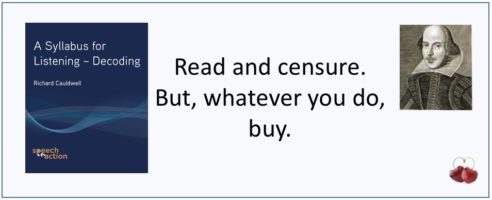40 – Read and censure – but buy
This is the fortieth post of this Listening Cherry series, and it is appropriate to mark this milestone moment with a major publication: A Syllabus for Listening – Decoding. This book was published on 2nd March, and aims to provide specific items for the listening syllabus.
There is no preface (although there is an introduction) so I thought I would borrow some sentences from my favourite preface of all time, that written by John Heminges and Henry Condell for their collection of Shakespeare’s plays known as the First Folio (1623).
Well ! It is now publique, & you wil stand for your priviledges wee know : to read, and censure. Do so, but buy it first. That doth best commend a Booke, the Stationer saies. Then, how odde soever your braines be, or your wisedomes, make your licence the same, and spare not. Judge your six-pen’orth, your shillings worth, your five shillings worth at a time, or higher, so you rise to the just rates, and welcome. But, whatever you do, Buy.
Some of the foundational ideas are that:
- The goals of listening and pronunciation require different models and practices
- The goal of pronunciation is clear intelligible speech
- The goal of listening is to understand anything (however messy and fast) that comes the listener’s way
- Pronunciation requires mastery of tidy intelligible speech
- Listening requires mastery of speech of all types, including unruly and messy speech
- Teaching decoding should be reconceptualised to ‘teaching the sound substance of language’
- The sound substance is inherently imprecise, indeterminate, mushy
- All words have multiple soundshapes, not just weak forms
- All sounds (‘phonemes’ ‘syllables’ ‘words’) can be dropped, blurred or blended
- The natural state for any word is to occur at speed in company with other words
- Words blur and blend into each other, and form word-clusters (e.g. ‘one of the’, ‘where there were’)
- Word clusters typically go much faster than the words with which they share a speech unit
- Repeated listening and gap-fill activities are insufficient to learn decoding
- Specific instruction is possible and necessary: e.g. ‘this is a sample of the range of soundshapes of the cluster ‘to be able to’
- Vocal gymnastics (‘pronunciation’ activities in the service of listening) are essential
For a description of the contents, and how to buy (before reading and censuring) go here.



Leave a Reply